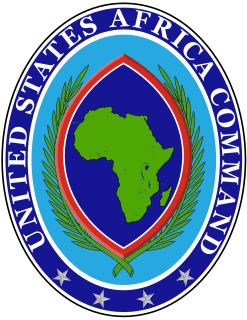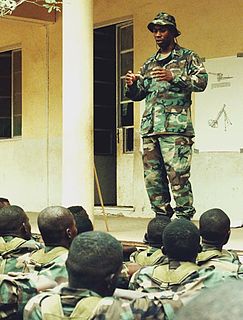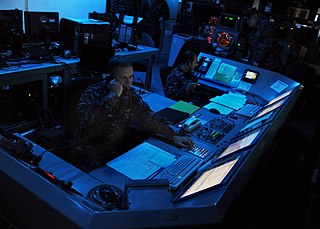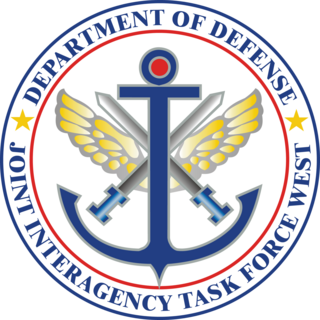Related Research Articles

The Office of Local Defense Community Cooperation (OLDCC), formerly the Office of Economic Adjustment (OEA), is a United States Department of Defense (DoD) field activity and the DoD's primary source for assisting communities that are adversely impacted by Defense program changes, including base closures or realignments, base expansions, and contract or program cancellations. To assist affected communities, OLDCC manages and directs the Defense Economic Adjustment Program and coordinates the involvement of other federal agencies.

The Office of the Secretary of Defense (OSD) is a headquarters-level staff of the United States Department of Defense. It is the principal civilian staff element of the U.S. Secretary of Defense, and it assists the Secretary in carrying out authority, direction and control of the Department of Defense in the exercise of policy development, planning, resource management, fiscal, and program evaluation responsibilities. OSD is the Secretary of Defense’s support staff for managing the Department of Defense, and it corresponds to what the Executive Office of the President of the U.S. is to the U.S. president for managing the whole of the Executive branch of the federal government.

The United States under secretary of defense for policy (USDP) is a high level civilian official in the United States Department of Defense. The under secretary of defense for policy is the principal staff assistant and adviser to both the secretary of defense and the deputy secretary of defense for all matters concerning the formation of national security and defense policy.

The State Partnership Program (SPP) is a joint program of the United States Department of Defense (DoD) and the individual states, territories, and District of Columbia. The program and the concept are entirely new, originating in 1993 as a simplified form of the previously established (1992) Joint Contact Team Program (JCTP). The JCTP aimed at assisting former Warsaw Pact and Soviet Union Republics, now independent, to form democracies and defense forces of their own. It featured long-term presence of extensive and expensive teams of advisory specialists. The SPP shortened the advisory presence to a United States National Guard unit of a designated state, called a partner, which would conduct joint exercises with the host. It is cheaper, has a lesser American presence, and can comprise contacts with civilian agencies. Today both programs are funded.

The United States Department of Defense is an executive branch department of the federal government charged with coordinating and supervising all agencies and functions of the government directly related to national security and the United States Armed Forces. The DOD is the largest employer in the world, with over 1.4 million active-duty service members as of 2021. More employees include over 826,000 National Guard and reservists from the armed forces, and over 732,000 civilians bringing the total to over 2.8 million employees. Headquartered at the Pentagon in Arlington, Virginia, just outside Washington, D.C., the DoD's stated mission is to provide "the military forces needed to deter war and ensure our nation's security".

The United States and the Republic of Kazakhstan established diplomatic relations on December 16, 1991. The United States opened its embassy in Almaty in January 1992 and then relocated to Nur-Sultan in 2006.

The United States Africa Command, is one of the eleven unified combatant commands of the United States Department of Defense, headquartered at Kelley Barracks, Stuttgart, Germany. It is responsible for U.S. military operations, including fighting regional conflicts and maintaining military relations with 53 African nations. Its area of responsibility covers all of Africa except Egypt, which is within the area of responsibility of the United States Central Command. U.S. AFRICOM headquarters operating budget was $276 million in fiscal year 2012.

Foreign internal defense (FID) is a term used by the militaries of some countries, including the United States, France, and the United Kingdom, to describe an integrated and synchronized, multi-disciplinary approach to combating actual or threatened insurgency in a foreign state. This foreign state is known as the Host Nation (HN) under the US doctrine. The term counter-insurgency is more commonly used worldwide than FID.
This article deals with the activities of the Central Intelligence Agency (CIA) of the federal government of the United States that are alleged violations of human rights.
United States Security Assistance Organizations (SAOs) are Federal Government of the United States military and civilian personnel stationed in foreign countries to manage security assistance and other military programs. SAOs are closest to these programs' operation and have the closest contact with host-country militaries.

The Civilian Response Corps is a program of the United States Department of State, Office of the Coordinator for Reconstruction and Stabilization (S/CRS). The Civilian Response Corps is currently a group of federal employees and volunteers from the private sector, state and local governments who are trained to deploy rapidly in countries that are in crisis or emerging from conflict in order to provide reconstruction and stabilization assistance. They are diplomats, development specialists, public health officials, law enforcement, corrections officers, engineers, economists, lawyers, public administrators, agronomists and others – offering the full range of skills needed to help fragile states in order to restore the stability and rule of law to achieve economic recovery and sustainable growth as quickly as possible.

American military operations other than war (MOOTW) focus on deterring war, resolving conflict, promoting peace, and supporting civil authorities in response to domestic crises.

Joint Interagency Task Force West is a standing United States military joint task force with the mission of combating drug-related transnational organized crime in the Indo-Asia-Pacific. JIATF West's area of responsibility (AOR) is that of United States Indo-Pacific Command (USINDOPACOM). JIATF West is one of two Joint Interagency Task Forces with a counter-narcotics mission. The other is Joint Interagency Task Force South. The task force is run as USPACOM's "executive agent" for counterdrug activities providing support to partner nation law enforcement. Approximately 166 active duty and reserve U.S. military forces; Department of Defense civilian employees; contractors; and U.S. and foreign law enforcement agency personnel are members of the task force.

The United States European Command State Partnership Program, according to its own mission, is a National Guard program that "links U.S. states with designated partner countries to ... support the command’s security cooperation objectives." Currently, 22 Partnerships exist "with former Soviet, Yugoslav and Warsaw Pact countries in the EUCOM Area of Responsibility." Becoming independent on the dissolution of the Soviet Union on December 26, 1991, these countries shortly requested the advice and assistance of the United States in creating new self-defense forces.
Initiated in 2013 by the 38th Chief of Staff of the Army, Raymond T. Odierno, regionally aligned forces (RAF) provide combatant commands (CCMDs), scalable and tailorable Army capabilities for all requirements, including operational missions, bilateral and multilateral military exercises and security cooperation activities. Army regional alignment is an organizing principle that improves the Army's ability to provide units and capabilities. Regional alignment provides focus and direction for unit training and preparation. RAFs are drawn from the Army Total Force, which includes active United States Army, the Army National Guard and the United States Army Reserve. Corps and divisions are aligned to ensure joint task force capability to every geographic combatant command (GCC). Through regional alignment, the Army maintains its war-fighting skills and complements these skills with language, regional expertise and cultural awareness training.

The Military Construction and Veterans Affairs, and Related Agencies Appropriations Act, 2014 is an appropriations bill that was introduced into the United States House of Representatives during the 113th United States Congress. The bill would appropriate money to various government agencies related to the United States Department of Defense and the United States Department of Veterans Affairs. This funding would be used during fiscal year 2014, which ends September 30, 2014. According to its committee report, "the purpose of the bill is to support our military and their families and provide the benefits and medical care that our veterans have earned for their service." The report also indicated that the Committee had made its decisions with the national debt and budget deficit in mind.

The Intelligence Authorization Act for Fiscal Year 2014 is a U.S. public law that authorizes appropriations for fiscal year 2014 for intelligence activities of the U.S. government. The law authorizes there to be funding for intelligence agencies such as the Central Intelligence Agency or the National Security Agency, but a separate appropriations bill would also have to pass in order for those agencies to receive any money.

The National Defense Authorization Act for Fiscal Year 2017 is a United States federal law specifying the budget and expenditures of the United States Department of Defense (DOD) for Fiscal Year 2017.

The chief management officer (CMO) of the United States Department of Defense (DoD) was the third-in-command of the department after the Secretary of Defense and Deputy Secretary of Defense. The position's purpose was to reduce costs by improving the quality and productivity of DoD's business operations. Congress disestablished the CMO position with the passage of the William M. (Mac) Thornberry National Defense Authorization Act for Fiscal Year 2021 effective 1 January 2021.